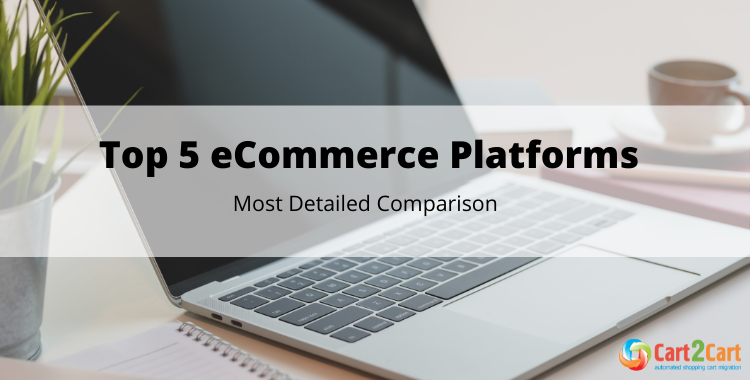Most certainly if you have investigated this clash between top eCommerce platforms the question in your mind arising which one is the finest to choose for business. Don’t worry though this article we will resolve your queries.
In a nutshell, Magento, Shopify, and BigCommerce are the topmost game-changer e-commerce platform that raised the bar. These names will surely pop up whenever someone researches an eCommerce platform. These top platforms hold a market share at a huge level and also provide modernistic remarkable innovations that become accustomed as per the changing technology.
Choosing the right eCommerce platform is essential for the growth of the eCommerce store. Whether a business is small or huge it doesn’t matter but the decision of selecting the right eCommerce platform must be taken wisely.
This platform offers an extensive range of functionality and features for a smooth flow of business activities. To assist we will compare the top three platforms to find out which one is best appropriate for business requirements.
Magento Vs Shopify vs Bigcommerce
Magento
Magento is a self-hosted platform that powers thousands of stores. Magento was launched in 2007, offers a free version and premium version. The platform is highly flexible and offers endless possibilities for modifying an online store.
Magento is an open-source eCommerce platform written in PHP. Developers can implement the core files and extend their functionality by adding new plug-in modules provided by other developers. Any big store is rarely using Magento because of some drawbacks with functionality that is expensive and requires a high budget.
Magento does not offer SaaS (security as a service) only offers on-site and cloud-hosted options. SaaS is the requirement of many businesses as it provides security areas with continuous updates.
Shopify
Shopify is an eCommerce platform and its headquarter is situated in Ottawa, Ontario. In January 2021 the company reported that in 175 countries Shopify is used by 1000000 businesses. Shopify lets people design user-friendly online stores without the need for a background in development. The creation of sites with Shopify has become an easy thing to do, simple steps are required to create a site and running it effortlessly. If extra features and functions are required by clients at that time, they need to add custom coding and additional apps.
BigCommerce
No prior experience is required in BigCommerce to create a website with a better user experience. Managing orders and adding products for Online stores is also an easy step with BigCommerce. The handless offering is also the biggest advantage of BigCommerce for backend users. BigCommerce has numerous pre-built plug-ins to frontend CMS and DXP systems like WordPress, Bloomreach, Drupal, etc. it means with one of the options available on websites clients can use BigCommerce on the backend and continue using the system they already know well on the frontend.
Breakdown: Magento vs Shopify vs BigCommerce
Pricing
Choices can be shortlisted after getting clear information of budget as some eCommerce platforms are affordable and some are expensive. Figuring out the initial cost with the ongoing cost is essential for proper budget allocation.
Magento – Magento is expensive as Magento is free to download but does not cover the cost of all hosting, security, development, and design fees. These costs are all covered by clients.
Shopify – Shopify is affordable with different pricing models as a Basic Shopify Plan starts at $29 and has the fewest features. More advanced plans range from $79-$299 a month. Shopify plus starts from 2000 $ p.m. which is suitable for larger business houses.
BigCommerce – BigCommerce is affordable and has several options for different price points. BigCommerce basic, starts at $29.00 per month, with more advanced plans at $79 and $249.
Ease of use
It’s also an essential factor that how much easy to understand and how to use the platform’s features, make full use of them. Clients want an eCommerce platform that is easy to use on the backend and frontend.
Magento – Magento is highly complex as on-site developers don’t provide help in building websites. The developer is needed for building a site and hosting partner for hosting solutions.
Shopify – Shopify is easy to use as it helps merchants who want to create an online store without having a background in development. Merchants can get a website up and running quickly by completing a few simple steps.
BigCommerce – BigCommerce is also easy to use as non-developer can create a website even if they have never done it before. BigCommerce has numerous pre-built plugins to frontend CMS and DXP systems like WordPress, Bloomreach, Drupal, etc.
Theme Selection
Theme selection must be a clean, functional, memorable extension of the brand.
Magento – Magento does not include any theme as native software in fact for themes businesses must find and buy their own from 3rd-party sites like Themify or pay a developer to build one.
Shopify – Shopify provides hundreds of mobile integrated themes for free or for buy.
BigCommerce – BigCommerce also provides hundreds of themes. Developers can fully-customizable templates that are available for both free or paid.
Hosting
The hosting solution decides hosting the software on-premise or will it be hosted through the cloud.
Magento – Magento provides on-premise, 3rd-party, or cloud-based hosting solutions. Magento is a PaaS, not a SaaS, so there isn’t a whole lot they’ll handle.
Shopify – Shopify provides cloud-based hosting with a Shopify subscription. There is no need to add a third party for hosting.
BigCommerce – BigCommerce provides cloud-based with subscription reduces the efforts needed in finding the hosting third party.
Security
eCommerce platforms never compromise the security of customer’s data and brand reputation.
Magento – Magento depends on client’s standards how secure they want to make they can seek help from developers. Magento creates security patches for security risks, that’s why it depends on clients to keep their systems up to date.
Shopify – Shopify is secure as it is available with security as a service SaaS.
BigCommerce – BigCommerce is highly secure as it provides SaaS multiple layers of strong security for all sites they host. BigCommerce has blazing-fast speed and is level PCI-1 compliant, SSL security, DDOS protection, 99.9% uptime.
Features
Every business has different requirements, needs for different eCommerce platforms. If the business is B2B, it might need options for different customer groups or, depending on your industry and they might need to offer multiple payment gateways and shipping options to keep up with competitors.
Magento – Magento has a wide range of features list for large product catalogs with lots of variants, and cross-selling and upselling features, native product bundles, and groups. Developers are required for customization of the ecommerce platform.
Shopify – Shopify has some native features and other functionalities but only available with third-party apps.
BigCommerce – BigCommerce has a wide number of native features that can eventually save businesses money by not depend on as many third-party apps.
Which eCommerce Platform Is the Best?
#Magento: best for big teams, with lots of resources
Magento is perfect for large business houses where a big-budget, high resources, and team of developers to handle the maintenance is involved in this scenario Magento is a suitable choice for business. customization of the site as per the merchant’s requirement can be easily performed by developers.
#Shopify: best for small shops wanting to get online
If merchants are new in eCommerce that time Shopify is the best for small shops to get online with much less experience in online trading.
#BigCommerce: best for both small and large shops
BigCommerce is suitable for all sizes of business even if it is small or large. With commendable features, best-in-class uptime, and robust security BigCommerce is perfect to choose. Large stores with the stock-keeping unit are well handled with BigCommerce.
Wrapping up
All three eCommerce platforms have their benefits and drawbacks. You should go with that platform that helps you increase subscribers, convert more leads, and boost sales as per the requirement of the business.


